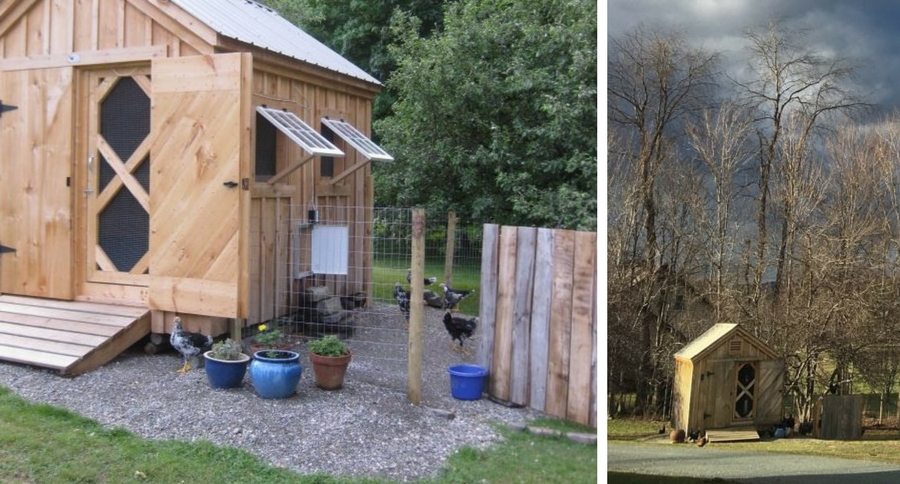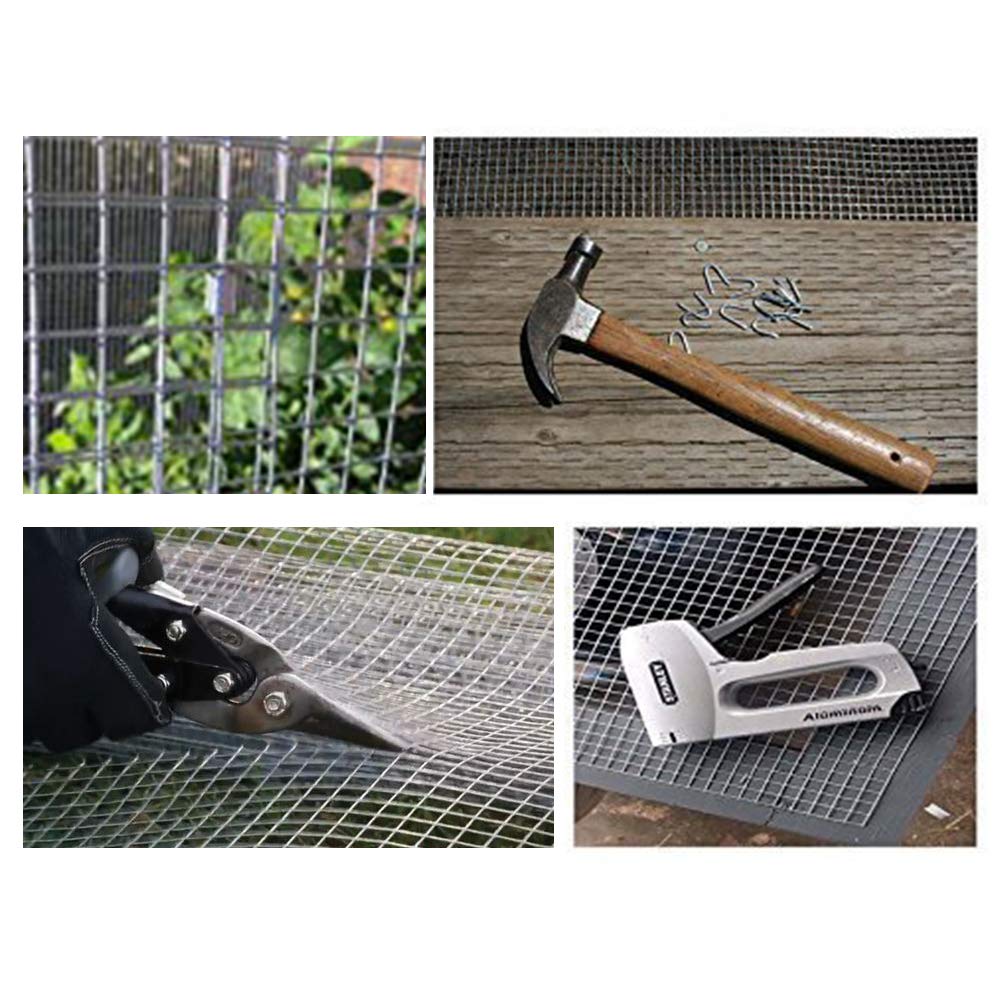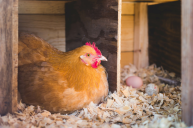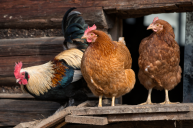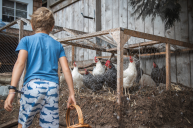Are you happy with your chicken coop?
If you are planning to set up a new coop, or you don't already have the best chicken coop for your backyard chickens, you know it can be difficult to get a coop design that's "just right."
The best chicken coop is a safe place from predators, convenient to access, and good for flock health during all four seasons (or five if you have the equivalent of Vermont's mud season). There are always tweaks and improvements, and new products and plans to try, so designing, outfitting, and improving your backyard chicken coop is an ongoing process.
Even so, there are basic essentials of a safe, functional, and beautiful coop that will pay off in fresh egg production and happy hens.
What are these basic essentials of the best coop for your backyard flock?
Your chickens need to be safe from predators.

Antique Fox bookplate via Grandpa's Market
The best chicken coop has hardware cloth (not chicken wire) on all window openings. I hear too many stories about raccoons breaking into coops because the coop was secured with chicken wire instead of hardware cloth.
1. Hardware Cloth
Reviews are wonderful! A customer even recommended this for chicken coops. Remember, this is what keeps your coop safe from predators.
Raccoons can twist open chicken wire and they WILL eat chickens. Use hardware cloth screwed to window openings (we used metal washers in our coop to hold the hardware cloth down as the screw head may not be a large enough diameter).
Gaps should be minimal to keep out mice and predators like the vicious least weasel. This predator can squeeze in small openings and wreak havoc once inside. Make sure you secure the coop perimeter, including a predator-proof door (we have a slide bolt on the main door, and a metal automatic pry-proof chicken door.)
https://www.instagram.com/p/ByysfjilfaJ/
Your chickens need proper ventilation.
The best chicken coop has good ventilation to eliminate moisture in winter and reduce heat in summer.
In the winter, chickens will suffer from frostbite if your coop is not ventilated correctly. Why? Moisture collects in a closed-up coop from two sources: the breath of chickens, and the high moisture content of chicken poop. That moisture will cause frostbite and illness.
https://www.instagram.com/p/BBjZO4JEMLO/
A damp closed-up cold coop causes far more problems than a dry cold coop. You need a balance of ventilation and protection.
Think about wild birds outside: they don't have walls and a roof, but they manage to stay warm enough. Given the shelter of a roof and the walls of a well-ventilated coop, your chickens will flourish.
https://www.instagram.com/p/BS5OOtUh9ig/
In an ideal coop, the chickens remain dry, sheltered from wind and drafts, but still have enough ventilation so that all the moisture from the coop is rapidly removed.
Our coop has a louver on each gable peak (these remain open all winter), a ventilated ridge in the roof, and a hardware cloth inner "screen door." The south side of the coop remains ventilated with this "screen door" unless the temperature drops to near zero and/or wind is coming from the south, in which case a solid wood outer door is then closed.
https://www.instagram.com/p/BUMkV8XgpxG/
During the summer, two windows on the east side of the coop are opened (although the openings are covered with hardware cloth "screening." The coop stays cool enough in the summer with the open south side, the gable vents, and the ridge ventilation.
The best chicken coop is easy to clean.
Cleaning chicken poop is why you want an easy-to-clean coop, but in the event your chickens ever have mites, you need to be able to clean ALL the nooks and crannies. The fewer nooks and crannies, the better!
We had a problem last year with mites, which hide in cracks and crevices during the day and then come out at night. Our coop has board and batten siding. The roosts are two-by-fours slotted into notched frames. There are a lot of nooks and crannies! It is horrible to have a mite infestation, but the easiest way to deal with it is to have an easy-to-clean coop.
The best chicken coops have the right amount of roost & nest box space.
The overall dimensions of our coop: eight-by-ten feet, or 80 square feet, and we have four roosting bars (each eight feet long). The average-sized chicken needs 12 inches of roost space.
A good rule of thumb is to have enough space between each roost. Our roosts are 18 inches apart. Actually, they could be closer because they are all on the same level, but if you have a ladder-type roost, 18 inches is a good distance.
The best chicken coop plans for one nesting box for every four hens (we have four nesting boxes inside and one outside).
https://www.instagram.com/p/BUKIe_PhLM3/
The best coop is made of safe non-toxic materials on any surface the chickens can touch.
Until recently, pressure-treated wood contained arsenic as a preservative. Pressure-treated wood is no longer supposed to contain arsenic when sold to consumers, but it is still legal in farm applications (pressure-treated fence posts from some farm supply outlets still contain arsenic as recently as 2015 when I last checked).
If you couldn't safely lick it, it shouldn't be in your coop, or at least not in an area your chickens can reach. That said, any part of your coop that comes into contact with the ground may have to be pressure-treated or of a rot-resistant wood like cedar or hemlock.
The important thing is that it's not in an area your chickens will be pecking at. Or lick.
https://www.instagram.com/p/BULTmgtFjEG/
For convenience and safety, consider an automatic door.
This is optional if you don't mind remembering to open and shut the coop every day, or if you arrive home in time to shut the door before dark; especially on those winter days when it gets dark at 4 p.m.
With an automatic chicken door, your chickens are safe from nighttime predators even if you forget to shut their run door or if you arrive home in the winter after dark (as I do). We use the Pullet-Shut automatic solar powered chicken coop door. I chose it because it is metal, and once shut, it is impossible for a predator to nose or paw it open.
2. Automatic Chicken Door
The top reviews on this chicken door say it all. It's light censored and water proof!
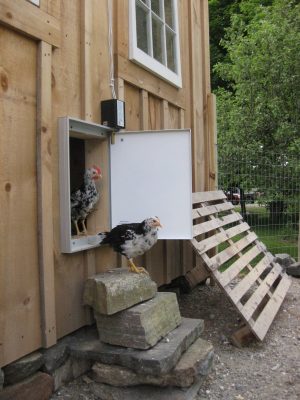
Daphne Cybele
With these things in mind, you can plan the best chicken coop (or chicken house, or better yet chicken palace!) possible, or upgrade your current coop. Every chicken deserves a safe, functional and beautiful coop!
What do you most want or love about your coop and raising chickens? Tell us in the comments below!
This post was originally published on May 19, 2017.
READ MORE: Best Eggs Ever: 8 Tips for a Healthy Flock of Chickens
WATCH NOW: Silkie Chickens Are Fluffy!
